Displaying 21 - 40 of 52
HIV and AIDS Civil Society Networks and the Faith Sector
Lessons Learnt from Strategic Engagement in India, Dominican Republic, Indonesia, and Jamaica
31 January 2023
Assembly workshop looked toward ending AIDS epidemic by 2030
19 September 2022
Ukraine: Responding to humanitarian need
08 September 2022
Together in the Mission of God
Jubilee Reflections on the International Missionary Council
21 August 2022
Called to Transformation - Ecumenical Diakonia
09 June 2022
African church leaders train in leadership, diakonia and development
12 November 2021


















